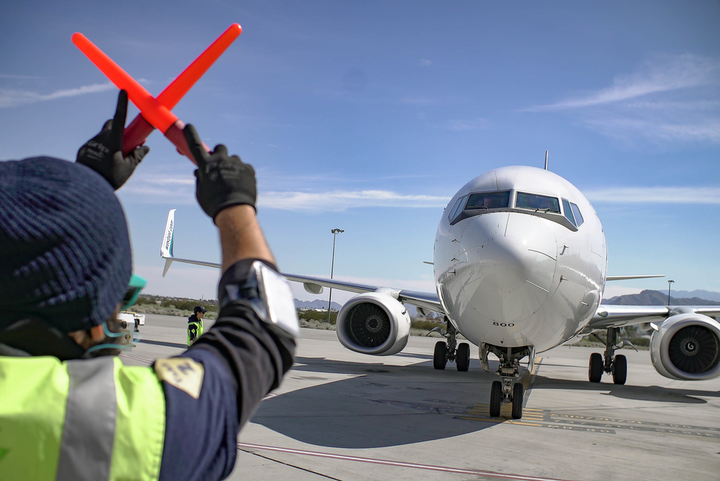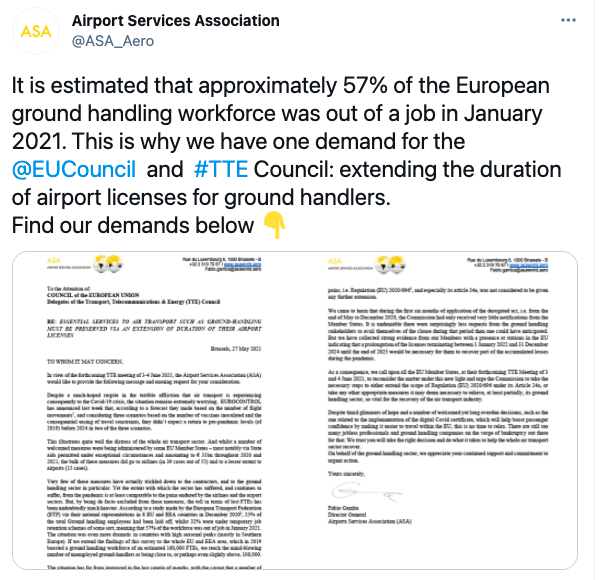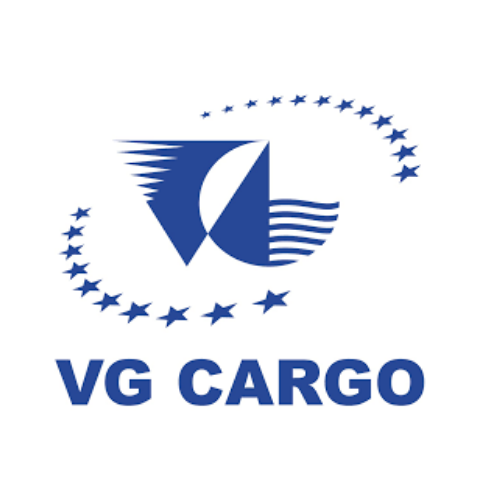Share this news on:
Newsletter - June 2021
Published on: 30 June 2021ASA'S MESSAGE OF THE MONTH
62% of ground handling businesses consider that the major issue they are currently faced with is related to an unbearable financial pressure (cash flow, fixed costs vs. revenues, etc.). This is one of the many striking findings that came out of the annual ASA Barometer.
You have spoken! Last month, we launched our annual ASA Barometer - a survey for key players in the ground handling industry, to hear how they have faired in the recent crisis. We would like to thank all those who took part in the survey and shared their thoughts with us.
Respondents were asked about their biggest challenges in the ongoing crisis. It became clear to us that financial pressure, personnel issues, lack of government support and pressure from airlines were among the difficulties faced by the ground handling community.
Furthermore, as the pressure increases for the ground handling industry to reduce its environmental footprint, ground handlers worldwide are coming up with innovative solutions to respond to the challenge. Over a third of the respondents understand the impact that environmental concerns will have on their businesses. As an association, ASA commits to proposing a voluntary sustainability scheme allowing GHSPs to gradually decarbonise their operations and get recognition for it.
You can read the find the full survey results report below.
Best regards,
Fabio Gamba
Download the survey results
MONTHLY REGIONAL INTERVIEWS - Uganda & Kuwait

In 2018, when the IMF projected that Uganda's GDP was to grow by 5.2% and 7.3% in 2018 and 2022 respectively, there were high hopes for the aviation industry. It was anticipated that the country's air traffic would follow the same positive trend. 6 months into 2021, are we there yet? Marc Deleu, Managing Director at DAS Handling, explains.
How has the pandemic affected the ground handling industry in Uganda?
The impact was substantial from the end of March 2020 until September 2020 where activities almost ground to a halt and left us with approximately 10% of our normal flight volumes. The only flights allowed were a number of cargo flights and repatriation flights which in hindsight helped to keep a number of staff engaged.
Most service providers had to restructure and chose to terminate a large number of staff but at DAS we felt we had a responsibility towards our teams who over the years have given so much towards this company. We chose to maintain employment during these difficult months through salary cuts and rotating schedules to give everyone the opportunity to remain functional. What surprised me personally is the level of commitment of some staff who showed extraordinary resilience, kept looking for opportunities, encouraged others, worked extra-long hours to get things done and ultimately helped us get through the darkest hour. This humbled me in many ways.
As a company the impact of the pandemic has wiped out any profitability in 2020 but through careful financial planning we have succeeded to survive the worst and we have maintained a positive attitude.
When do you believe air travel will return to pre-COVID levels?
Since activities resumed in October 2020, we have seen a steady rise of flights and loads month after month, which leads us to believe that bar a second lockdown we should reach pre-pandemic levels towards the end of 2021. We see passenger confidence returning and a surprising rising appetite for travel. As vaccination levels increase, I believe this confidence will only be bolstered further. In short we anticipate a healthy second half of the year.

A good 6,000km away, Kuwait also found itself in a tricky situation when the COVID crisis hit. Lukasz Skorupa, NAS Group Chief Commercial Officer, explains.
How has the pandemic affected the ground handling industry in Kuwait?
As a precautionary measure to curb the pandemic, Kuwait was the first country in the region that suspended all international flights to and from Kuwait International Airport on 13th March last year. In August 2020, the country decided to gradually resume passenger flights to and from Kuwait in three, six-month phases.
Unfortunately, due to increasing covid cases, the airport continues to be closed for foreigners to enter. This has had its negative impact on the ground handling business and commercial airlines. It's been exceptionally hard for NAS, that has a major market share in the country and is headquartered here. Just to give clear comparison – in year 2019 NAS handled around 40,000 departures out of Kuwait while in 2020 close to 15,000 departures. Passenger traffic dropped by 75% with no visible recovery in 2021, while overall cost of ground handling increased, following implementation of new health & safety norms.
At the same time cargo operations continued uninterrupted and cargo carried on passenger aircraft in belly and cabin became a norm. So we simply had to adapt to a new way of handling these aircrafts.
When do you believe air travel will return to pre-COVID levels?
At NAS, we are focusing efforts on recovery of travel by implementing preventive measures in our airport operations, working with local government entities to introduce digital solutions to make travel safer and collaborating with partner organisations to make solutions interoperable .
In Kuwait, travel is still restricted but the Government is taking steps to open it up again. Currently, the airport is slated to open for expats to return at the end of this month. Many airlines and airports around the world are pushing for such efforts and we already see slow recovery ahead of summer season. Looking at current situation, the recovery has started and will continue to be steady. Some large domestic markets have already recovered, but I do not expect international traffic to reach the same levels before 2024.
IN THE MEDIA: WORKING TOWARDS THE RETURN
aviationpros.com, May 20, 2021

Around the world, aviation’s workforce is hurting with some regions faring worse than others. A return to pre-pandemic levels is in sight but making a successful return will take work of its own.
The industry’s recovery, and as such the workforce, is disparate with some locations faring better than others.
“Overall, I would say the situation is quite good, both in Southeast Asia, the Pacific and the U.S. or North America, and still quite bad in Europe and Latin America and in Africa,” says Fabio Gamba, director general, Airport Services Association (ASA).
ASA ON SOCIAL MEDIA
Earlier in May, ASA sent a letter to the European Council and Delegates of the Transport, Telecommunications & Energy (TTE) Council to ask for more support for the ground handling industry, in light of the difficulties experienced during the COVID-pandemic. As we are all aware, state aids were permitted under special circumstances, but the bulk of these measures went to airlines and less to airports. We demanded that extension of airport licenses be granted to ground handling businesses.

This month ASA was represented at...
The EASA Aerodromes Technical Body Meeting, ADR.TeB (attended by Fabio Gamba, on 5 May 2021)
The Global Airport Leaders' Forum (presentation given by Fabio Gamba, on 24 May 2021)
Do you want to contribute to our next edition, by sharing your news, contents or announcements? Please email d.vitry@eoipsocommunications.com.
OUR ANNOUNCEMENTS
ASA WELCOMES THREE NEW MEMBERS:

VG Cargo GmbH is a leading air cargo handling company, specialising in High Value Freight. In 2014, VG Cargo opened its facility at Frankfurt International Airport utilizing the central EU location and the improved motorway infrastructure for independent and air-cargo related trucking.

USIMAT SERMEES is a reliable partner of all airport actors (airlines, airports, handling companies), based in Nogent Le Roi, near Paris. Based on Innovative Enginering solutions, they provide GSE that are fully aligned to the needs of our worldwide customers, and specificities of each of them.

DENGE Airport Equipment, is the leading Ground Support Equipment manufacturer in Turkey with its experience over 35 years in history. Since 1982, DENGE is serving to different industries with its wide range of products. These products are being marketed in Turkey and in more than 60 countries worldwide.